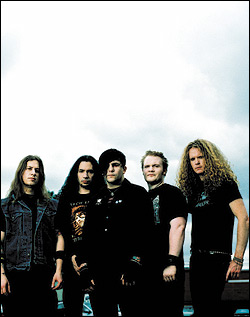THE AMERICAN ASTRONAUT
written and directed by Cory McAbee with Cory McAbee, Gregory Russell Cook, and Rocco Sisto runs Nov. 16-29 at Grand Illusion
SO YOU’VE GOT a dollop of David Lynch’s nonconformist imagination, a yen to make an interstellar action-adventure flick, and absolutely no budget. What to do? Shoot in black and white and pile on shadows like pancakes at an all-you-can-eat buffet. The American Astronaut may be the blackest B&W effort ever, a space opera of irksome invention that nevertheless strangely embodies the overused catchall “independent spirit.”
Cory McAbee is The American Astronaut‘s quirky engineer, directing himself as the gritty, planet-hopping commodities smuggler Samuel Curtis. Prior to entering a rockabilly dance-off with old pal The Blueberry Pirate in a seedy asteroid belt outpost, Curtis agrees to transport phone-sex tapes to all-male Jupiter, swap them for planetary icon The Boy Who Actually Saw a Woman’s Breast, then trade said Boy (Gregory Russell Cook) to the ravenous beauties of Venus for a deceased “stud” who’s suspended upright in a memorial coffin. The only obstacle is villainous Professor Hess, who must forgive Curtis for a nebulous old affront before he can vaporize him.
OK, time out. The notion of indie film originality is well and fine as long as Hollywood keeps defecating on Joe Q. Movie goer, but Astronaut pushes its intentional C-movie/Ed Wood vibe to the point of exasperation. Admittedly, McAbee executes his ridiculous ideas to the best of his limited abilities, intercutting archaic space illustrations, shooting 75 percent of the film in Curtis’ ship (obviously somebody’s converted den), and yes, laying on the shadows. This is laudable strictly from a guerrilla filmmaking standpoint.
Unfortunately, each plot point is accompanied by a truly banal song from McAbee’s real-life rock outfit, the Billy Nayer Show. (Sample lyric: “The girl with the vagina made of glass . . . so perfect and pure, so gynecologically demure.”) The simpering Hess, played by Rocco Sisto like Frank Booth’s tic-laden cousin, is the most intolerable of Astronaut‘s several obnoxious vocalists.
Some moments are inspired, however. The Boy sports wings and epaulets, ࠬa Mercury, not because his planet “makes” him, he explains, but because it “lets” him. (He tersely describes the breast to an eager Jupiter congregation thusly: “It was round and soft.”) Curtis’ robotic alarm clock bleats, “What did your father teach you?” His inexplicable answer, “My father taught me to kill the sunflower,” earns the clock’s smarmy congratulations for waking up.
All this quote-unquote originality goes for naught when a filmmaker seems to be catering inside humor to his friends. It’s far more courageous to engage an unfamiliar, potentially hostile audience. McAbee’s only doing that by default.







